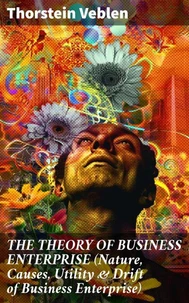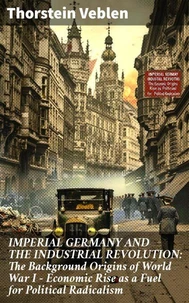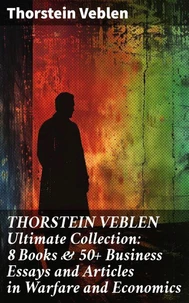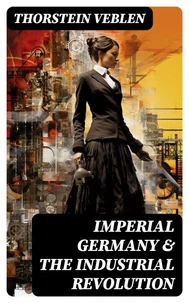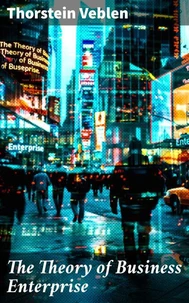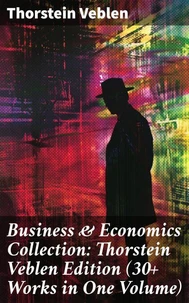IMPERIAL GERMANY AND THE INDUSTRIAL REVOLUTION. The Background Origins of World War I
Par :Formats :
Disponible dans votre compte client Decitre ou Furet du Nord dès validation de votre commande. Le format ePub est :
- Compatible avec une lecture sur My Vivlio (smartphone, tablette, ordinateur)
- Compatible avec une lecture sur liseuses Vivlio
- Pour les liseuses autres que Vivlio, vous devez utiliser le logiciel Adobe Digital Edition. Non compatible avec la lecture sur les liseuses Kindle, Remarkable et Sony
 , qui est-ce ?
, qui est-ce ?Notre partenaire de plateforme de lecture numérique où vous retrouverez l'ensemble de vos ebooks gratuitement
Pour en savoir plus sur nos ebooks, consultez notre aide en ligne ici
- Nombre de pages325
- FormatePub
- ISBN859-65--4777148-7
- EAN8596547771487
- Date de parution01/01/2024
- Protection num.Digital Watermarking
- Taille516 Ko
- Infos supplémentairesepub
- ÉditeurDIGICAT
Résumé
In "Imperial Germany and the Industrial Revolution, " Thorstein Veblen presents a critical analysis of the interplay between industrialization and socio-economic structures in late 19th-century Germany. Veblen's literary style is marked by a keen wit and incisive prose, merging philosophical inquiry with economic theory. He meticulously explores the antecedents of Germany's rapid industrial growth, highlighting the impact of technology and class dynamics.
Set within the broader context of the Gilded Age, Veblen's work reflects both historical narratives and forward-looking critiques, illuminating the correlation between industrial development and the cultural ethos of imperialism. Thorstein Veblen, an influential economist and sociologist, emerged from the Progressive Era with a unique perspective shaped by his experiences in both the academic sphere and the socio-economic landscape of his time.
His groundbreaking ideas on conspicuous consumption and social stratification inform his critique of the German industrial model. Veblen was particularly interested in how economic frameworks influenced societal behaviors, leading him to dissect the socio-economic implications of industrial advancements. This thought-provoking study is essential for anyone seeking to understand the complexities of industrialization as a force that reshaped society.
Veblen's incisive observations challenge readers to consider not merely the economic outcomes of a revolution but also the profound societal changes that accompany such transformations.
Set within the broader context of the Gilded Age, Veblen's work reflects both historical narratives and forward-looking critiques, illuminating the correlation between industrial development and the cultural ethos of imperialism. Thorstein Veblen, an influential economist and sociologist, emerged from the Progressive Era with a unique perspective shaped by his experiences in both the academic sphere and the socio-economic landscape of his time.
His groundbreaking ideas on conspicuous consumption and social stratification inform his critique of the German industrial model. Veblen was particularly interested in how economic frameworks influenced societal behaviors, leading him to dissect the socio-economic implications of industrial advancements. This thought-provoking study is essential for anyone seeking to understand the complexities of industrialization as a force that reshaped society.
Veblen's incisive observations challenge readers to consider not merely the economic outcomes of a revolution but also the profound societal changes that accompany such transformations.
In "Imperial Germany and the Industrial Revolution, " Thorstein Veblen presents a critical analysis of the interplay between industrialization and socio-economic structures in late 19th-century Germany. Veblen's literary style is marked by a keen wit and incisive prose, merging philosophical inquiry with economic theory. He meticulously explores the antecedents of Germany's rapid industrial growth, highlighting the impact of technology and class dynamics.
Set within the broader context of the Gilded Age, Veblen's work reflects both historical narratives and forward-looking critiques, illuminating the correlation between industrial development and the cultural ethos of imperialism. Thorstein Veblen, an influential economist and sociologist, emerged from the Progressive Era with a unique perspective shaped by his experiences in both the academic sphere and the socio-economic landscape of his time.
His groundbreaking ideas on conspicuous consumption and social stratification inform his critique of the German industrial model. Veblen was particularly interested in how economic frameworks influenced societal behaviors, leading him to dissect the socio-economic implications of industrial advancements. This thought-provoking study is essential for anyone seeking to understand the complexities of industrialization as a force that reshaped society.
Veblen's incisive observations challenge readers to consider not merely the economic outcomes of a revolution but also the profound societal changes that accompany such transformations.
Set within the broader context of the Gilded Age, Veblen's work reflects both historical narratives and forward-looking critiques, illuminating the correlation between industrial development and the cultural ethos of imperialism. Thorstein Veblen, an influential economist and sociologist, emerged from the Progressive Era with a unique perspective shaped by his experiences in both the academic sphere and the socio-economic landscape of his time.
His groundbreaking ideas on conspicuous consumption and social stratification inform his critique of the German industrial model. Veblen was particularly interested in how economic frameworks influenced societal behaviors, leading him to dissect the socio-economic implications of industrial advancements. This thought-provoking study is essential for anyone seeking to understand the complexities of industrialization as a force that reshaped society.
Veblen's incisive observations challenge readers to consider not merely the economic outcomes of a revolution but also the profound societal changes that accompany such transformations.


